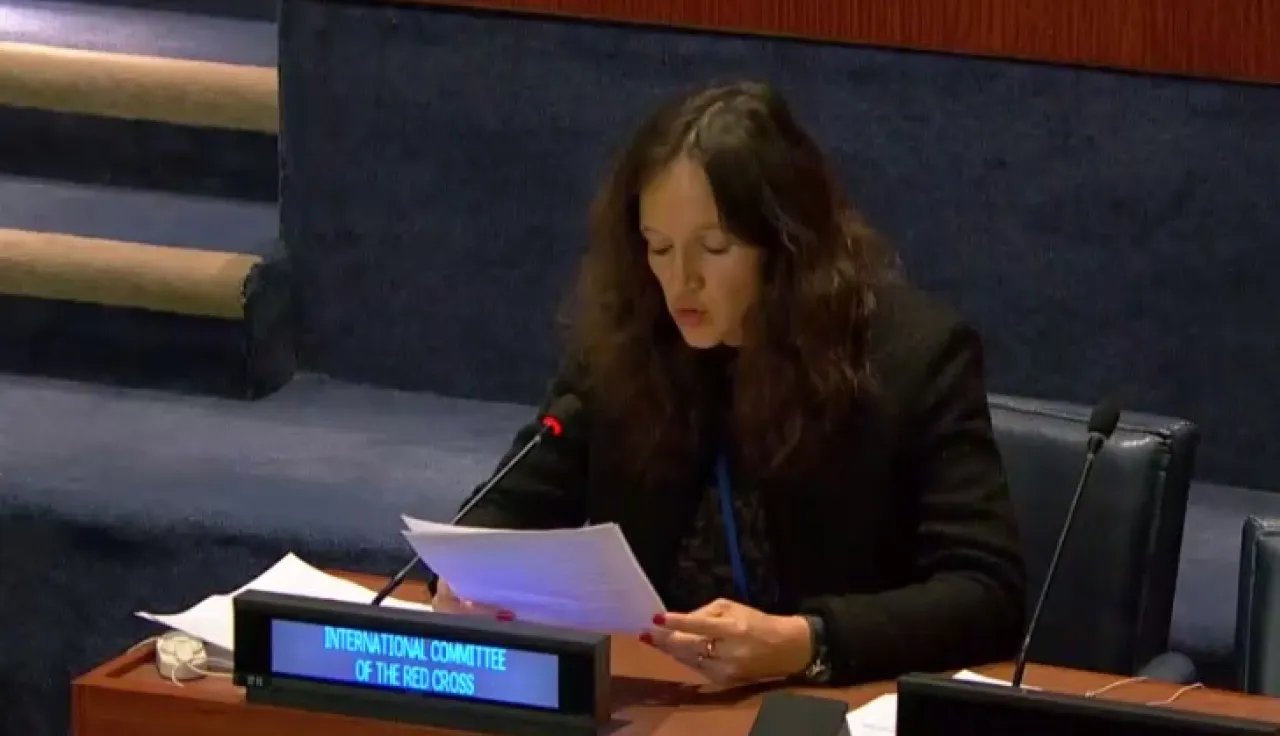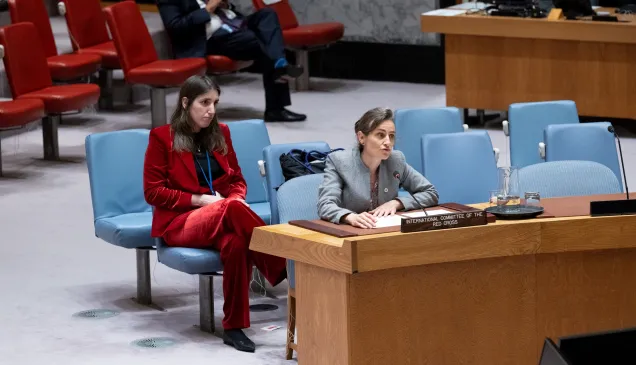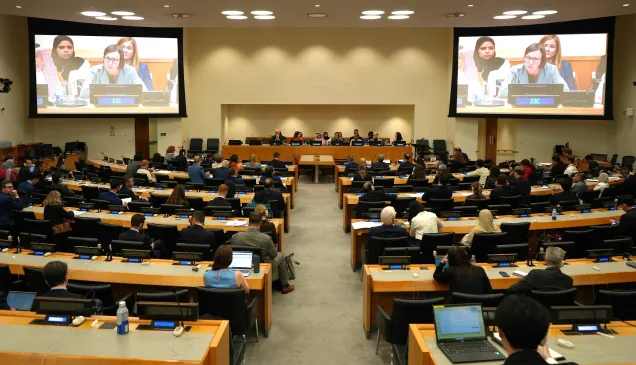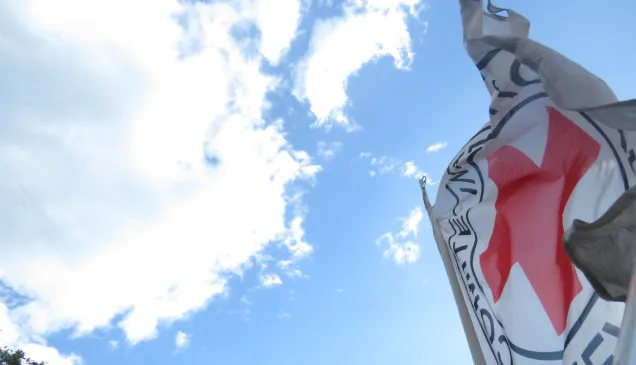Delivered by Ms. Agnès Coutou, Humanitarian Affairs Adviser, ICRC NYC
Thank you, Madam Chairman.
Over the last 20 years, the UNSC has entrusted UN peacekeeping operations (PKOs) with the authority to use force, up to deadly force, to ensure protection of civilians, including "stabilization" tasks and neutralization of security threats. This robust posture has de facto increased the likelihood of applicability of international humanitarian law (IHL) to PKOs and of their being designated as party to an armed conflict for the purposes of this body of law. The International Committee of the Red Cross has a dynamic dialogue with UN peacekeeping missions at both the strategic and field levels to ensure a positive contribution to Protection of Civilians (PoC) strategies, IHL compliance and the protection of humanitarian space.
While the Department of Peace Operations has just revised its PoC policy, the ICRC would like to share four messages:
First: respect and ensuring respect for the applicable legal framework is critical.
UN forces must comply with all relevant international rules, be it International Humanitarian Law, which is the framework of conduct of hostilities, or International Human Rights Law, the framework of maintenance of law and order. In all contexts, senior UN mission personnel must be made aware of the classification of the relevant national situation under international law so that they understand the rights and obligations of all parties, including their own.
The ICRC's opinion is that the applicability of IHL to multinational forces depends exclusively on the circumstances prevailing on the ground. This is irrespective of the international mandate assigned to such forces or the term used to designate the party (or parties) potentially opposing them.
The determination of the legal framework applicable to operations is pivotal to define the Rules of Engagement and the content of the training troops and police contingents need to receive before they are deployed or in-mission.
The UN Peacekeeping Missions are in a privileged posture to bring parties to the conflict back to an attitude of respect for humanitarian law, by using their influence on these parties. The Human Rights Due Diligence Policy offers a sound framework to apply due diligence and a leverage to influence behaviours.
At a time of enhanced partnership between the UN and the African Union, including on collective security arrangements, States and international organizations should make sure that troops and police are adequately trained, equipped and instructed to ensure compliance with IHL.
Second: engaging communities for protection purposes must be done in a safe and respectful way.
In protecting those at risk, it is crucial that UN Missions keep a do-no-harm principle at the center of their operations and mindset. Military, police and civilian personnel need to maintain proximity to the populations they intend to protect. Nevertheless, in some contexts close association with a multidimensional mission may pose personal risks to individuals and communities. Risk assessments may mitigate some of these concerns.
Affected people should be recognized as experts of their own situation: they need to be consulted in a culturally-sensitive manner. In most cases, they have already developed strategies to protect themselves that should not be undermined. Helping the communities to enhance their self-protection mechanisms should however not be considered as a substitute for the protection responsibilities of authorities.
A suggestion for peacekeeping policy makers is to increase the ceiling of the Police component in peacekeeping missions for the double purpose of enhancing community engagement and the better delivery of law enforcement related tasks, including arrest and deprivation of liberty.
The ICRC welcomes the commitment made by the Secretariat and many TCCs/PCCs to increase the presence of women in peacekeeping. Such initiatives allow for a more comprehensive engagement with entire communities, including girls and women and allow for a more relevant prevention approach and response to violations/protection threats.
Third: Physical protection should remain a fundamental part of the PoC toolbox available to peacekeepers.
The ICRC recommends that PKOs resources are focused on operations, armed or unarmed, in which peacekeepers are the only ones able to, or are the best placed to deliver, such as physical protection. The ICRC recognizes the value of the full spectrum of assets available to peacekeepers, and the importance of non-military assets in protecting civilians. It welcomes PoC unarmed approaches as integral parts of PoC mandates. Those approaches should, however, not be seen as substitutes, but rather complement armed interventions by peacekeepers to protect civilians. In exploring how to enhance unarmed approaches, peacekeeping operations must improve their capacities to physically protect and deter violence on civilians. Against the backdrop of shrinking resources and in the spirit of complementarity with other protection stakeholders, we recommend that UN Missions focus on unarmed protective activities that contribute directly to protection gains and study their complementarity with the work of uniformed personnel.
Fourth: Protection of healthcare by peacekeepers should be considered as an essential part of their PoC mandate.
During their operations, PKOs may have to ensure access to healthcare to wounded and sick as one of the main features of their PoC mandate. The landmark Security Council resolution 2286 explicitly recognizes that PKOs can contribute to a secure environment and enable the delivery of medical assistance, in accordance with humanitarian principles. Resolution 2286 specifically foresees a role for peacekeeping missions in fostering a conducive environment for the delivery of healthcare. In this regard peacekeepers can make a positive contribution to healthcare by ensuring as much as possible that wounded and sick are taken care of and/or enjoy safe access to healthcare. They can ensure security perimeters around health facilities whose personnel, means and premises are at risk of attacks. They can provide medical evacuations in an impartial manner. They can also refrain from disturbing delivery of medical services while having strict procedures when searching health facilities for law enforcement operations or as part of their patrolling tasks.
To deliver on those tasks, peacekeepers need clear guidance, sound collaboration with humanitarian actors as well as adequate resources.
The ICRC staff and volunteers of the Red Cross/Red Crescent know first-hand the human cost of failure to protect but they have also directly benefited from or have witnessed effective protective interventions from peacekeepers, from DRC to South Sudan, from Bangui to Bamako.
We look forward to continuing to work with peacekeeping missions, troop and police contributing countries and the UN Secretariat to further strengthen our constructive cooperation during pre-deployment and in-country.




